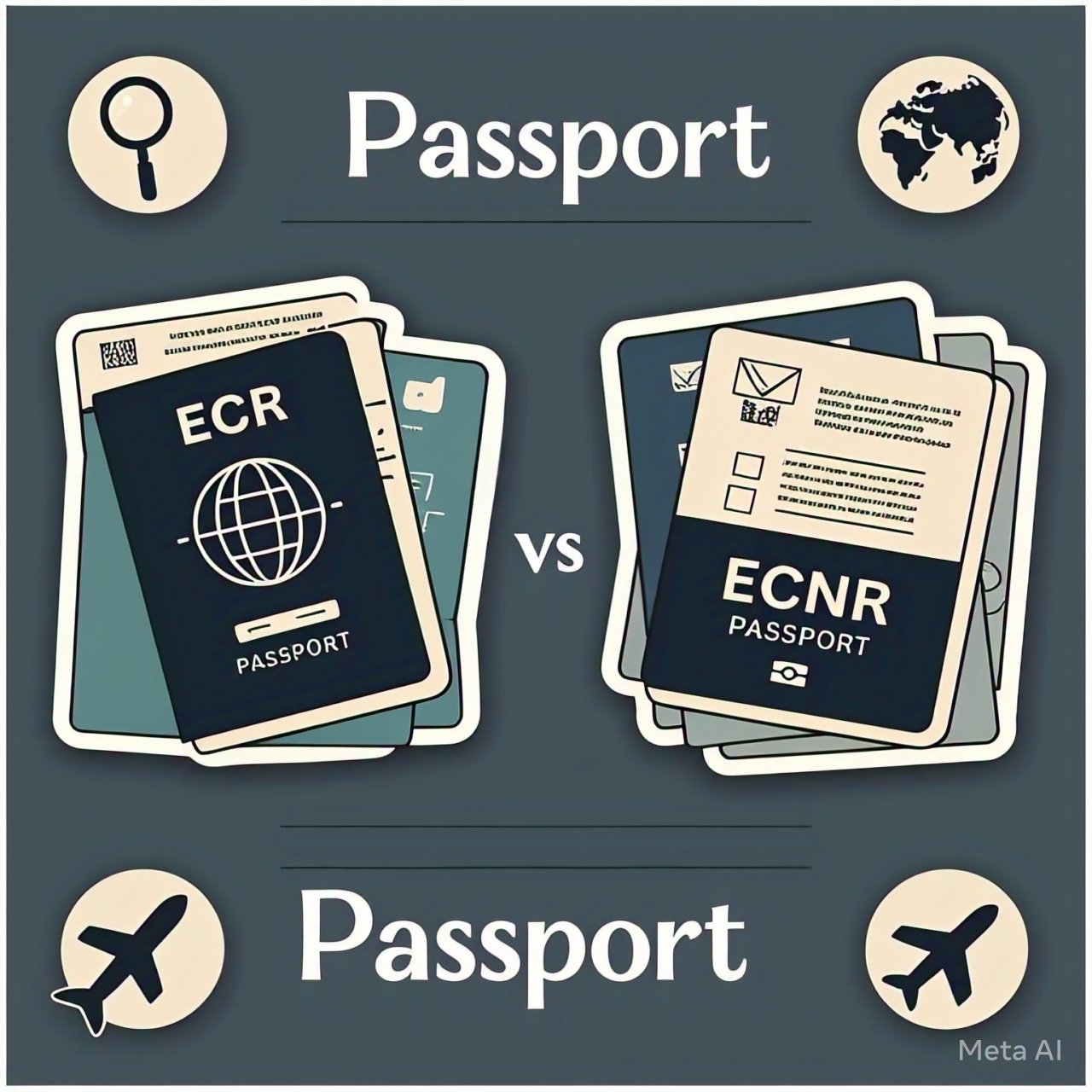Navigating the world of travel documentation can be confusing, especially when you come across terms like ECR Passport vs ECNR Passport. Whether you’re applying for your first Indian passport or need to update your travel documents, understanding the difference between an ECR Passport (Emigration Check Required) and an ECNR Passport (Emigration Check Not Required) is crucial. In this comprehensive guide, we dive deep into what these designations mean, how they affect your travel, and which one you might need based on your personal circumstances.

Table of Contents
What Are ECR and ECNR?
Understanding the terms ECR Passport and ECNR Passport is the first step in determining which passport is best for your needs.
Definition of ECR Passport
An ECR Passport is issued to Indian citizens who do not meet certain educational or professional criteria set by the Indian government. This passport type requires an emigration check before travel, mainly to ensure that citizens moving abroad for work are doing so legally and are protected against exploitation. If you hold an ECR Passport, you might be subject to additional screening by authorities before leaving India.
For detailed information on the background of ECR, visit the Wikipedia page on Indian passports.
Definition of ECNR Passport
In contrast, an ECNR Passport is issued to Indian citizens who meet the necessary qualifications (such as higher education or specific skills) or are in certain employment categories. This passport does not require an emigration check, making the travel process smoother and quicker. Essentially, if you qualify for an ECNR Passport, you are considered less likely to face issues during emigration, and your travel documentation reflects that trust.
Key Differences Summarized
- ECR Passport:
- Issued to individuals not meeting specific criteria.
- Requires additional emigration checks.
- Common among applicants with lower educational qualifications or non-professional backgrounds.
- ECNR Passport:
- Issued to individuals meeting the set qualifications.
- Exempts the holder from additional emigration checks.
- Generally awarded to professionals and those with higher education.
Understanding these differences is essential for ensuring smooth international travel and avoiding delays at immigration checkpoints.
Eligibility Criteria and Application Process
Your eligibility for either passport type depends on several factors, including your education, employment status, and sometimes even your age. Below, we break down the requirements and steps involved in obtaining your passport.
Eligibility Criteria for an ECR Passport
Applicants are generally classified as eligible for an ECR Passport if they:
- Do not have a college degree or recognized professional qualification.
- Are not engaged in skilled employment that meets the government’s criteria.
- Often belong to a segment of the population that might be more vulnerable during overseas employment.
Eligibility Criteria for an ECNR Passport
Applicants who qualify for an ECNR Passport generally:
- Possess a recognized college degree or professional qualification.
- Are employed in sectors considered skilled or have work experience in a field that meets government criteria.
- May be traveling for purposes such as higher studies, employment in reputable organizations, or other professional pursuits.
Application Process for Both Passport Types
The process of applying for either passport type is similar but with some nuances:
- Document Collection:
- Collect all necessary documents, such as proof of identity, address, and educational or employment certificates.
- Check the specific document requirements on the Passport Seva portal.
- Online Application:
- Fill out the application form online, ensuring you select the correct category based on your qualifications.
- Upload the required documents in the prescribed format.
- Verification Process:
- For an ECR Passport, your application will trigger an emigration check, and you may be asked for additional documents.
- An ECNR Passport application, on the other hand, proceeds with less intensive verification.
- Interview/Appointment:
- Applicants are usually required to attend an appointment at the nearest Passport Seva Kendra (PSK) for biometric and document verification.
- Ensure you bring all original documents for verification.
- Issuance:
- Once verified and approved, your passport is processed and dispatched.
- The timeline may vary depending on the type of passport and any additional checks required.
For further clarity on the application process, refer to the detailed guides on Passport Seva.
Key Differences Between ECR and ECNR
To help you better understand how the two passport types differ, here is a comparison table:
| Feature | ECR Passport | ECNR Passport |
|---|---|---|
| Eligibility | Lower educational or non-professional qualifications | Higher education or recognized professional skills |
| Emigration Check | Required before travel | Not required |
| Application Process | Additional documentation may be needed | Smoother, with fewer verification hurdles |
| Travel Convenience | May experience delays at emigration clearance | Faster processing and fewer hurdles during travel |
| Target Audience | Applicants from vulnerable sections or less qualified | Professionals, students, and skilled workers |
This table clearly highlights the core differences between an ECR Passport and an ECNR Passport.
Impact on International Travel
When planning international travel, the type of passport you hold can have significant implications. Here’s what you need to know:
Additional Emigration Checks for ECR Passport Holders
Holders of an ECR Passport are often required to undergo an emigration check before they are allowed to travel abroad. This extra layer of scrutiny is designed to:
- Verify that the applicant is not being exploited in overseas employment.
- Ensure that the individual has sufficient documentation and financial stability.
- Prevent illegal or fraudulent migration practices.
These checks, while necessary, can lead to delays in travel if the documentation is not complete or if discrepancies arise during verification. It is always a good idea to start your passport process early and ensure all paperwork is in order.
Smooth Travel with an ECNR Passport
With an ECNR Passport, the emigration check is waived, meaning:
- You are considered low-risk by the authorities.
- The verification process is streamlined.
- You face fewer delays at immigration checkpoints, allowing for a more hassle-free travel experience.
The Role of Government Policies
Both passport types are governed by policies set forth by the Ministry of External Affairs and implemented via the Passport Seva portal. These policies aim to protect the interests of citizens, especially those traveling for employment in foreign countries.
Real-World Implications
For many Indian citizens, the distinction between ECR Passport vs ECNR Passport can mean the difference between a smooth departure or encountering unexpected hurdles at the airport. Whether you are moving abroad for higher education, a promising job opportunity, or even leisure travel, knowing which passport type you hold—and the implications of that status—can help you plan better.
Common Misconceptions and Expert Insights
There are several myths surrounding ECR Passport vs ECNR Passport status that often cause confusion:
Misconception 1: “An ECR Passport Means I Can’t Work Abroad”
While it’s true that an ECR Passport requires an emigration check, it does not outright prevent you from working overseas. It simply means that additional checks are in place to ensure your safety and compliance with legal standards.
Misconception 2: “Only Uneducated People Get an ECR Passport”
The truth is more nuanced. The criteria for an ECNR Passport include specific educational or professional qualifications. However, many capable professionals might still fall under the ECR category due to nuances in their documentation. This underscores the importance of verifying your status with the relevant authorities.
Expert Insights
Experts in international travel and immigration stress the importance of:
- Accurate Documentation: Ensure all your educational and professional documents are updated and in the prescribed format.
- Early Application: Start your passport process early, especially if you plan to work or study abroad.
- Consulting Official Sources: Always refer to the Passport Seva portal or consult with a legal expert if you are uncertain about your status.
By debunking these misconceptions, you can approach your passport application with greater confidence and clarity.
Frequently Asked Questions (FAQ)
1. What does ECR mean on my passport?
ECR stands for Emigration Check Required. It indicates that additional checks are necessary before the holder is allowed to travel abroad for employment. This is primarily to ensure the applicant’s safety and to verify that the person meets the necessary criteria as set by the government. For more details, visit the Ministry of External Affairs.
2. How do I know if I qualify for an ECNR Passport?
Qualification for an ECNR Passport depends on your educational qualifications, professional credentials, and sometimes age. If you have a recognized college degree or are employed in a skilled profession, you are likely eligible for an ECNR Passport. Check the detailed eligibility criteria on the Passport Seva portal.
3. Can I convert an ECR Passport to an ECNR Passport later?
In some cases, if you obtain additional qualifications or secure a job in a skilled sector, you might be eligible for conversion. However, this process involves re-submission of relevant documents and undergoing the necessary verification process. It is advisable to consult the official guidelines provided on the Passport Seva website for the most accurate information.
4. Does holding an ECR Passport affect my international travel?
While an ECR Passport may require additional emigration checks, it does not restrict international travel per se. However, be prepared for extra scrutiny at immigration checkpoints, and ensure that you have all necessary documentation in order.
5. Are there any additional fees or processing times associated with either passport type?
The fees for both passport types are generally similar; however, processing times might vary if additional checks are required for an ECR Passport. Always check the latest fee structure and processing timelines on the Passport Seva portal before applying.
Conclusion
Understanding the difference between ECR Passport vs ECNR Passport is more than just a bureaucratic necessity—it’s an essential aspect of your international travel planning. An ECR Passport implies that your travel will involve additional emigration checks, whereas an ECNR Passport offers a smoother, more expedited process.
By ensuring that you meet the eligibility criteria and keeping all your documentation updated, you can avoid unnecessary delays and complications. Whether you’re pursuing a career abroad, planning to study overseas, or simply traveling for leisure, knowing which passport type applies to you will help you prepare adequately for your journey.
Disclaimer and Affiliate Disclosure
Disclaimer: This article is intended for informational purposes only and does not constitute legal or professional advice. Always consult official government resources or a professional advisor for the most accurate and updated information regarding passport applications and travel documentation.
Affiliate Disclosure: Some of the links provided in this article are affiliate links. If you click on these links and make a purchase, we may earn a small commission at no extra cost to you. This helps support our efforts to provide you with up-to-date and quality content.







